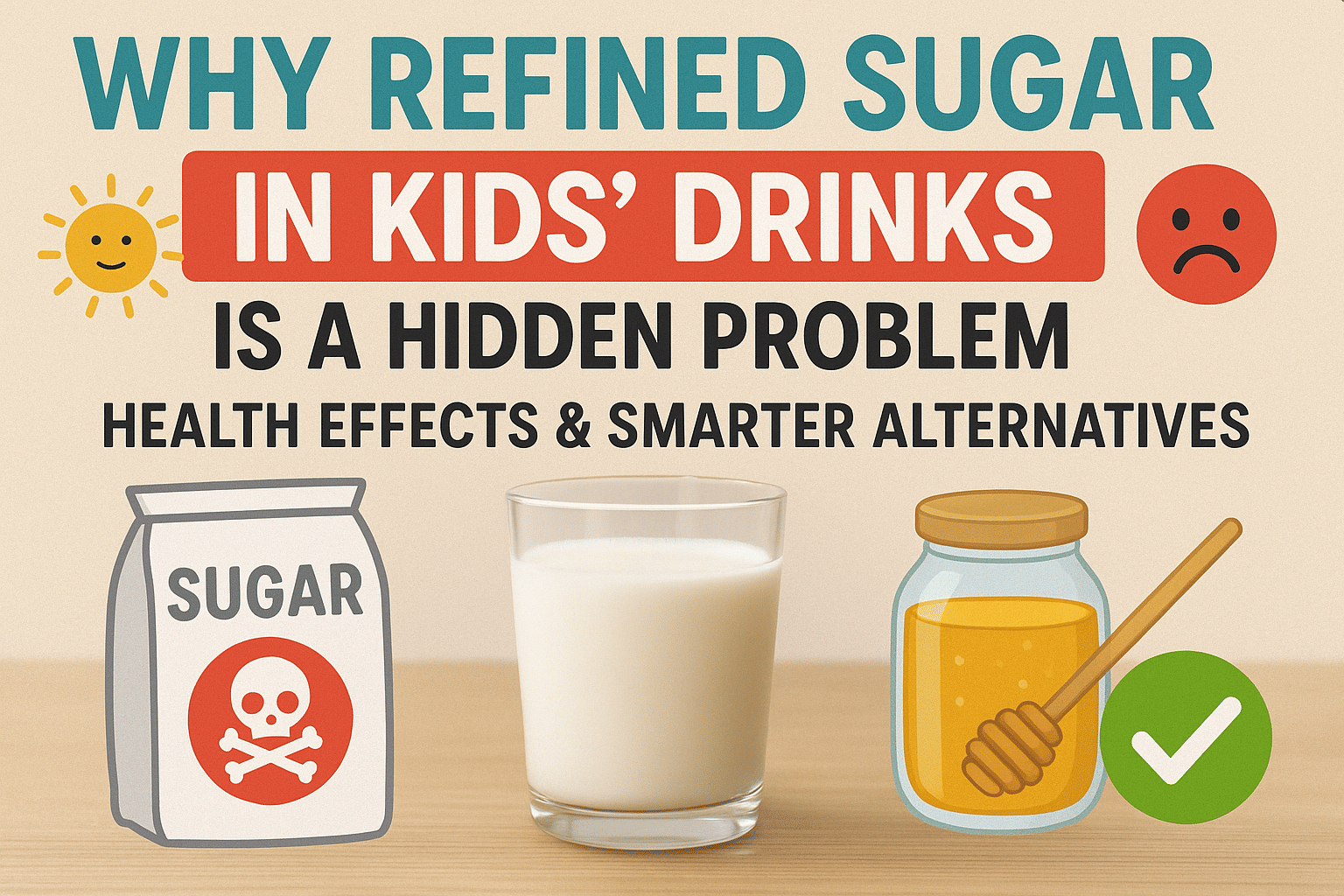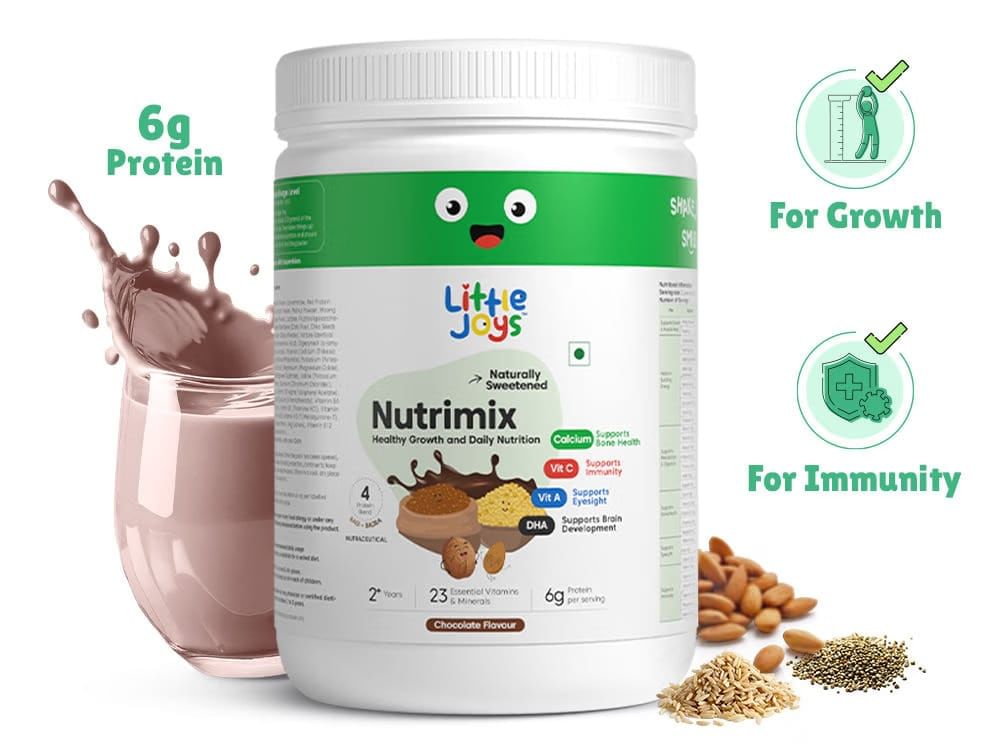Why Refined Sugar in Kids’ Drinks Is a Hidden Problem — Health Effects & Smarter Alternatives

As a parent, you might think that giving your child a flavored milk or nutrition drink is harmless — but many kids’ drinks hide refined sugar in ways that contribute to long-term health issues. In this article, we’ll compare refined sugar vs natural sweeteners, dig into the risks of high sugar consumption in children, and explore smarter alternatives — including how something like Little Joys Nutrimix (a no sugar milk mix / kids nutrition powder) can help you reduce hidden sugars while still offering taste, protein, vitamins, and minerals.
Understanding Sugars — Refined vs Natural Sweeteners
What is refined sugar?
Refined sugar (often listed as sucrose, high fructose corn syrup, cane sugar, glucose syrup, dextrose, etc.) is sugar that has been processed to remove molasses and natural nutrients. It is rapidly absorbed, gives quick energy spikes, but lacks vitamins, minerals, fiber, or antioxidants.
What are natural sweeteners?
Natural sweetening options include jaggery, dates, fruit concentrates, honey (for older children), and dried fruits. These carry along trace minerals, antioxidants, and fiber that slow absorption and offer some micronutrient benefit. A review article on replacing refined sugar with natural sweeteners highlights that natural sweeteners often have lower glycemic load and additional phytonutrients
Why refined sugar is particularly risky in kids’ drinks
- Hidden sugars: Many flavored milks, “health drinks,” powdered mixes, and packaged juices list sugar or sweeteners under multiple names. More than two-thirds of packaged foods carry added sweeteners.
- Sugar overload: In India, studies show children may consume 20–25 teaspoons of sugar daily – well beyond WHO limits.
- Metabolic burden: Frequent sugar spikes stress insulin regulation, may lead to early insulin resistance or obesity.
- Liver, fat, and inflammation risk: High fructose in sugary drinks is linked to non-alcoholic fatty liver disease, systemic inflammation, and changes in lipid profiles.
- Cognitive & behavioral effects: Some studies link high sugar intake in children to impaired memory, concentration, mood swings, and poorer academic performance.
- Dental decay: Frequent exposure to sugar fuels tooth decay, especially when sipped over long durations.
- Poor appetite & nutrient displacement: When children are full of sugary drinks, they may refuse whole food meals, displacing essential protein, fiber, vitamins, and minerals.
In short, refined sugar in kids’ drinks is a “hidden problem” because it is easy to consume in excess, often under disguise, and quietly undermines health over time.
Natural Sweeteners & Smarter Alternatives — What Works
Pros & cons of common natural sweeteners
The aim is not zero sweetness (children have innate preference), but reduced reliance on refined sugar, strategic blending, and shifting habit patterns.
A well-designed kids’ nutrition powder or milk mix can integrate these alternatives while balancing taste, texture, micronutrients, and protein.
How Little Joys Nutrimix Avoids the Sugar Trap (and Supports Health)
Here’s how a thoughtfully formulated Little Joys Nutrimix (or Little Joys milk mix / nutrition drink powder / protein mix for kids) can help your child enjoy a drink without the hidden refined sugar burden:
Core principles in formulation
- Zero refined sugar / no white sugar / no preservatives / no artificial colors or flavors
- Use of natural sweeteners (jaggery, dates, dried fruit) in minimal, balanced quantities
- Fortified with added vitamins and minerals, including calcium, zinc, iron, and vitamin D, to help support growth and development.
- Base built on millet + nut + grains (ragi, bajra, jowar, almond, cashew) so the drink inherits fiber, micronutrients, and plant protein
- Designed for easy mix (hot or cold milk) and acceptability (chocolate, vanilla variants)
- Age-specific variants (e.g. 2–6 yrs, 7–12 yrs) to avoid overnutrition
Benefits of using such a mix
- Reduces reliance on sugary packaged health drinks and flavored milks
- Maintains taste and acceptability while controlling sugar load
- Helps provide protein and key micronutrients, including nutrients that support normal immune health.
- Acts as a support supplement (not a full meal), giving parents a practical option on days when cooking or appetite is challenging
Sensible usage & cautions
- Use once a day max; do not replace whole food meals
- Monitor portion sizes to avoid excessive calorie intake
- Rotate with unsweetened whole food drinks (e.g., plain milk with fruit, porridge)
- Check for allergies (nuts)
- Gradually reduce other sugar sources (jaggery sweets, candies, sweetened beverages) to reset palate
Practical Tips for Parents to Cut Refined Sugar in Kid Drinks
Audit & reduce hidden sugar sources
- Read ingredient lists — look for sugar synonyms (glucose, maltose, syrup, dextrose, etc.)
- Avoid offering sweet drinks between meals
- Use unsweetened bases (milk, yogurt) and flavor with natural additives (masala, cocoa, fruit, cinnamon)
- Dilute juice or flavored drinks with water or milk
- Serve drinks in smaller quantities / with meals
Transition strategies for picky or sugar-addicted kids
- Gradually lower sweetness over days/weeks
- Mix a small amount of your no-sugar nutrition drink (e.g. Nutrimix) with current favorite drink, gradually increasing share
- Use fun serving (colorful cups, straws, toppings) to shift focus from sweetness
- Encourage water, plain milk, and fruit as primary fluids
- Use the “7-day sugar challenge” approach (cut added sugar progressively) — experts have used that with families
Alternatives & companion habits
- Use nuts, seeds, or dry fruits to sweeten porridges or snack mixes
- Flavor with vanilla, cinnamon, cardamom, cocoa (without sugar)
- Encourage fruit whole or as smoothies (without added sugar)
- Reward with experience (outing, story) instead of sweets
What the Research Says — Sugar, Health, Millets & Nutrition Blends
- High intake of refined sugar is associated with metabolic syndrome, obesity, insulin resistance in children.
- Replacement of refined sugar with natural sweeteners shows benefits in reducing glycemic load and improving antioxidant profiles.
- Millet-based blends (millet + pulses + nuts) in children’s diets have shown improvements in anthropometric measures and health markers.
- Millets themselves are gluten-free, have low glycemic index, and contain beneficial phytochemicals that may ameliorate metabolic disorders.
Thus, combining a millet-nut base with natural sweeteners and fortification is supported by nutritional research
Summary & Parenting Takeaways
- Refined sugar in kids’ drinks is a sneaky “hidden problem” — easy to consume excessively, often masked, and damaging over time (to metabolism, teeth, cognition, weight).
- Natural sweeteners (jaggery, dates, fruit purees) are better alternatives, though they also need moderation.
- A well-designed nutrition drink powder (like Little Joys Nutrimix) built on millets and nuts, fortified, and sweetened with natural sources, can act as a smart bridge between taste appeal and sugar control.
- But such products are helpers — not replacements for meals or whole foods. Rotate, balance, and use them wisely.
- Over time, your child’s palate can adapt to less sweetness — making natural, wholesome drinks (plain milk, water, fruit, millet shakes) the norm.

